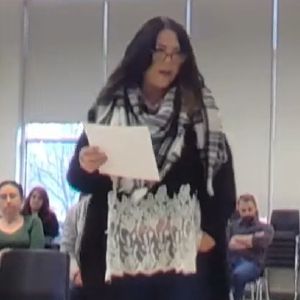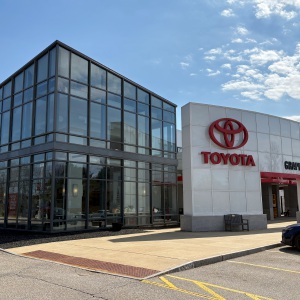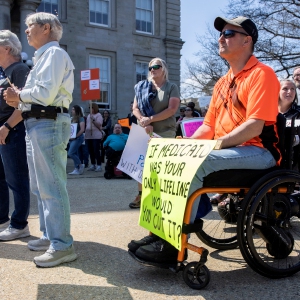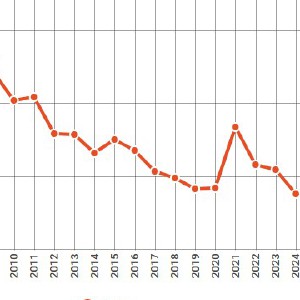New translation tech helps New Hampshire DMV expand language access
| Published: 11-26-2024 10:00 AM |
There’s a new interpreter at the New Hampshire DMV. Its name is Pocketalk, and it retails for a little under $300. As the demand for assistance in languages other than English rises, the DMV is hoping that the new technology will expand their language capacity.
“It’s been really positive so far,” said Administrator Kathy O’Neal. “We’ve seen people come back with their friends now that we can offer this service to them.”
Twenty of these devices were implemented earlier this summer and have text-to-speech capabilities in over 80 languages. Unlike a human interpreter, they are available on request at all full-time DMV locations throughout the state.
O’Neal saw the Pocketalk at a conference she went to in Wisconsin about a year ago. So far, O’Neal said that the Pocket Talk has gotten a lot of good reviews and other state agencies have visited the DMV to see it in action.
Despite the expanded capabilities, the tech still has limitations. It takes a long time to take the knowledge test with the Pocketalk because of the text-to-speech feature. It’s slightly better at saying things like “turn left” or “stop at the corner” during a driving test. Even though the DMV has used it for both tests, O’Neil said the pocket talk shines with paperwork.
“It’s really meant for simple conversations, not full length conversations,” O’Neal said. “Customers, they’re here, they want a title or they want an ID, so we ask, ‘Please fill this out. Do you have this? Do you have that?’”
The DMV estimated they helped 3,600 customers in a language that wasn’t English last year. O’Neal didn’t have numbers for previous years, but she said that the demand is definitely growing.
Despite the added language capabilities, DMV administrators are quick to point out that this isn’t a case of robots replacing humans.
Article continues after...
Yesterday's Most Read Articles
 Former superintendent of the year is resigning to become EMT amid rising political attacks on schools
Former superintendent of the year is resigning to become EMT amid rising political attacks on schools
 GOP lawmaker wasn’t fired over transgender bathroom comments, business owner says
GOP lawmaker wasn’t fired over transgender bathroom comments, business owner says
 Two of five Grappone auto franchises to be sold as part of family transition
Two of five Grappone auto franchises to be sold as part of family transition
 ‘We honor your death’ – Arranging services for those who die while homeless in Concord
‘We honor your death’ – Arranging services for those who die while homeless in Concord
 ‘I want this space to be community’: Witchlight Oracle Apothecary prioritizes connections and spirituality
‘I want this space to be community’: Witchlight Oracle Apothecary prioritizes connections and spirituality
 ‘A large chunk of change’: Feathered Friend Brewing disputes tariff on Canadian import
‘A large chunk of change’: Feathered Friend Brewing disputes tariff on Canadian import
Shah Sherazi is a supervisor at the DMV and speaks Hindi, Urdu, Pashto and English, although he can also understand Farsi and Arabic. As someone who uses his language skills daily, he says there’s always a switch when customers realize he speaks their language.
“Sometimes they were scared, like they don’t know how to do it and maybe somebody will reject their application,” he said. “So what I always do is I would prefer to talk in their language, and they will feel more comfortable.”
Sherazi is one of two dozen multilingual staff at DMV offices across the state, but language access in government agencies is often a resource puzzle. He can’t be everywhere at once. Customers can come in while he’s at another branch or out sick. He said while Spanish is pretty well represented at the DMV, but the Pocket Talk has helped him in languages that aren’t as common like Chinese.
Director John Marasco pointed out that getting a U.S. driver’s license can be a really big deal for immigrants.
“We don’t want anybody coming to the DMV that’s worried about, am I going to have a good experience? Am I going to be successful? So the language translation, I think first and foremost, alleviates those concerns,” he said.
Marasco is also looking for ways to make speakers of other languages more comfortable at the DMV. In addition to providing Pocketalks, he’s looking at increasing language accessibility by hiring more multilingual staff and looking for grants to translate the manuals into other languages.
“We don’t have a subway system here. You can’t just always walk to everything,” he said. “Getting that license and being mobile is important and this allows people to have that opportunity and not let language stand in the way.”
There’s a new interpreter at the New Hampshire DMV. Its name is Pocketalk, and it retails for a little under $300. As the demand for assistance in languages other than English rises, the DMV is hoping that the new technology will expand their language capacity.
“It’s been really positive so far,” said Administrator Kathy O’Neal. “We’ve seen people come back with their friends now that we can offer this service to them.”
Twenty of these devices were implemented earlier this summer and have text-to-speech capabilities in over 80 languages. Unlike a human interpreter, they are available on request at all full-time DMV locations throughout the state.
O’Neal saw the Pocketalk at a conference she went to in Wisconsin about a year ago. So far, O’Neal said that the Pocket Talk has gotten a lot of good reviews and other state agencies have visited the DMV to see it in action.
Despite the expanded capabilities, the tech still has limitations. It takes a long time to take the knowledge test with the Pocketalk because of the text-to-speech feature. It’s slightly better at saying things like “turn left” or “stop at the corner” during a driving test. Even though the DMV has used it for both tests, O’Neil said the pocket talk shines with paperwork.
“It’s really meant for simple conversations, not full length conversations,” O’Neal said. “Customers, they’re here, they want a title or they want an ID, so we ask, ‘Please fill this out. Do you have this? Do you have that?’”
The DMV estimated they helped 3,600 customers in a language that wasn’t English last year. O’Neal didn’t have numbers for previous years, but she said that the demand is definitely growing.
Despite the added language capabilities, DMV administrators are quick to point out that this isn’t a case of robots replacing humans.
Shah Sherazi is a supervisor at the DMV and speaks Hindi, Urdu, Pashto and English, although he can also understand Farsi and Arabic. As someone who uses his language skills daily, he says there’s always a switch when customers realize he speaks their language.
“Sometimes they were scared, like they don’t know how to do it and maybe somebody will reject their application,” he said. “So what I always do is I would prefer to talk in their language, and they will feel more comfortable.”
Sherazi is one of two dozen multilingual staff at DMV offices across the state, but language access in government agencies is often a resource puzzle. He can’t be everywhere at once. Customers can come in while he’s at another branch or out sick. He said while Spanish is pretty well represented at the DMV, but the Pocket Talk has helped him in languages that aren’t as common like Chinese.
Director John Marasco pointed out that getting a U.S. driver’s license can be a really big deal for immigrants.
“We don’t want anybody coming to the DMV that’s worried about, am I going to have a good experience? Am I going to be successful? So the language translation, I think first and foremost, alleviates those concerns,” he said.
Marasco is also looking for ways to make speakers of other languages more comfortable at the DMV. In addition to providing Pocketalks, he’s looking at increasing language accessibility by hiring more multilingual staff and looking for grants to translate the manuals into other languages.
“We don’t have a subway system here. You can’t just always walk to everything,” he said. “Getting that license and being mobile is important and this allows people to have that opportunity and not let language stand in the way.”
These articles are being shared by partners in the Granite State News Collaborative. For more information, visit collaborativenh.org.







 Baseball: Slow night at the plate costs Concord in loss to Windham, 3-1
Baseball: Slow night at the plate costs Concord in loss to Windham, 3-1 ‘It's like slow genocide’: Crowd rallies against proposed Medicaid cuts
‘It's like slow genocide’: Crowd rallies against proposed Medicaid cuts New Hampshire births fell to a modern low in 2024
New Hampshire births fell to a modern low in 2024 ‘New Hampshire is just going to embarrass itself’: Former Child Advocate warns against proposed office cuts
‘New Hampshire is just going to embarrass itself’: Former Child Advocate warns against proposed office cuts
